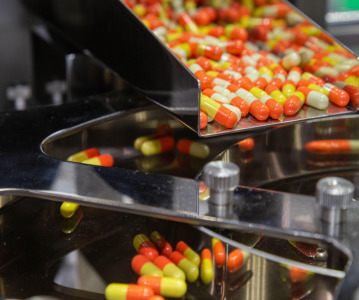Double threat: new drug shows potential against both COVID-19 and cancer
.png)
Researchers have investigated and reported on the potential of GRP78 inhibitors in both reducing the spread of SARS-CoV-2 and as a treatment for certain types of cancers.
USC (Los Angeles, USA) and the Cleveland Clinic Florida Research and Innovation Center (Port St. Lucie, USA) researchers have investigated the role of protein GRP78 in the spread of SARS-CoV-2, and the potential of a particular drug to reduce the virus’ replication.
Research published in the journal Nature Communications explored the key cellular processes of GRP78, a chaperone protein that aids in the regulation of protein folding. Healthy cells require a certain fraction of GRP78 in order to function properly. Cells under stress require more. However, in a study conducted by the Keck School of Medicine (Los Angeles, USA), it was suggested that when the SARS-CoV-2 virus is introduced into a cell, GRP78 is essentially hijacked to work with other cellular receptors to bring the virus inside the cell, allowing for its replication and subsequent spread. Further studies into human lung epithelial cells infected with SARS-CoV-2 demonstrated that as the viral infection intensified, infected cells produced higher levels of GRP78.
Professor of biochemistry and molecular medicine at the Keck School of Medicine Amy S. Lee stated: “A major problem in fighting SARS-CoV-2 is that it is constantly mutating and adapting itself to more efficiently infect and multiply in its host cells... If we keep chasing the virus around, this could become quite challenging and unpredictable.”
The team, led by Lee, utilised a special mRNA tool to investigate the suppression of GRP78 production in human lung epithelial cells in cell culture while not disrupting other cellular processes. These cells were then infected with the SARS-CoV-2 virus and were found to produce a lower amount of the viral spike protein, releasing much less of the virus to infect other cells. This demonstrates that GRP78 is necessary and essential for viral replication and production. Subsequent studies targeted GRP78 with a small molecule drug on the infected lung cells. The drug, HA15, was developed for use against cancer cells, and bind specifically GRP78 to inhibit its activity.
“Lo and behold, we found that this drug was very effective in reducing the number and size of SARS-CoV-2 plaques produced in the infected cells, in safe doses which had no harmful effect on normal cells,” Lee commented.
Along with another GRP78 inhibitor, YUM70, Lee and her team separately studied the effect of HA15 in cancer. Both drugs suppressed the production of mutant KRAS proteins, a mutation that has historically resisted drug treatment. The viability of cancer cells with such mutations was reduced in pancreatic, lung, and colon cancer. While further research and clinical trials are required to establish the safety and efficacy of HA15 and YUM70 in humans, other GRP78 inhibitors are also being investigated as potential treatments for both COVID-19 and cancer.
Source: New drug shows promise for fighting both COVI | EurekAlert!
Related News
-
News Pharmapack Awards 2024 Patient-Centric Design Award Winner – Dr Ferrer BioPharma
The 2024 Pharmapack Awards celebrated the best in innovation and design for the pharmaceutical packaging and drug delivery industry on January 24, 2024. -
News Women in Pharma: Minding the Gap at Pharmapack 2024
2024 marks the first year Pharmapack will host a Diversity track dedicated to bridging the gap within the pharmaceutical packaging and drug delivery sector. The track includes a panel discussion on 'Enabling Diversity in the Workplace,' focused... -
News Pharmapack Awards 2024 - Celebrating Packaging and Drug Delivery Innovation
The 2024 Pharmapack Innovation Awards ceremony celebrated the best in pharmaceutical packaging and drug delivery innovation at all levels. The awards were held on January 24, 2024 at the Paris Expo Porte de Versailles. -
News 2024 Pharma Industry Trends Outlook: Collaboration, Market Maturity, and Digital Futures
The annual CPHI Online 2024 Pharma Trends Outlook, in partnership with Arvato Systems, identifies 12 key industry trends shaping the life sciences industry in the coming year. -
News New Novo Nordisk AI hub for drug discovery to open in London, UK
Danish pharmaceutical giant Novo Nordisk will be opening an AI-based research facility in the heart of London to advance drug discovery operations. -
News BioNTech to begin mRNA vaccine manufacturing in Rwanda by 2025
German biotechnology company BioNTech has stated their intentions to begin production at their mRNA vaccine factory in Rwanda by 2025, which will mark the first foreign mRNA vaccine manufacturing site on the continent of Africa. -
News Women in Pharma: Looking back on 2023 and moving forward to 2024
In this monthly series, we interview women from across the pharmaceutical industry and supply chain to discuss the importance of gender diversity in healthcare, the workplace, and beyond. -
News CPHI Barcelona 2023: Partnering for Success – Managing Outsourcing Relationships to Optimise Manufacturing Operations
During CPHI Barcelona 2023, insightful content sessions offered attendees the chance to explore trending topics with expert speakers and panellists. Here, we summarise what the pharma industry and supply chain are talking about the most.
Position your company at the heart of the global Pharma industry with a CPHI Online membership
-
Your products and solutions visible to thousands of visitors within the largest Pharma marketplace
-
Generate high-quality, engaged leads for your business, all year round
-
Promote your business as the industry’s thought-leader by hosting your reports, brochures and videos within your profile
-
Your company’s profile boosted at all participating CPHI events
-
An easy-to-use platform with a detailed dashboard showing your leads and performance







